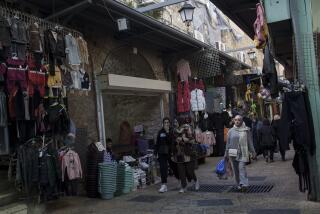Islam Claims Jerusalem Too
- Share via
The significance of Jerusalem in Islamic tradition has often been given short shrift in the mainstream media. This is, in part, due to the attempts of some ardent supporters of Israel to rewrite Islamic history in such a way as to de-emphasize the Muslim attachment to Jerusalem and thereby undermine the Muslim claim to the Holy City.
In fact, Jerusalem has played a pivotal and recurring role throughout Muslim history. The Muslim roots in Jerusalem go as deep in history as their faith in all the prophets, up to the Prophet Muhammad, who lived and preached the worship of one God.
In the early days of Islam, Muslims first prayed in the direction of Jerusalem. This continued until some time after the Prophet Muhammad and the early Muslims migrated from Mecca to Medina, when the divine decree was revealed instructing Muslims to pray toward Mecca, as had the Prophet Abraham (patriarch of the three monotheistic faiths) before them.
The Islamic centerpiece of Jerusalem is Haram al Sharif (the Noble Sanctuary), the compound within the walls of the Old City that contains both the widely recognized Dome of the Rock mosque and historically the even more significant Al Aqsa mosque.
The Koran makes numerous references to Jerusalem. The first verse of the 17th chapter states: “Glorified be He (God) who took his servant (Muhammad) for a journey by night from al Haram mosque (in Mecca) to Al Aqsa mosque (in Jerusalem), whose precincts we have blessed.”
The miraculous night journey referred to in this verse is that of the Prophet Muhammad from Mecca to Jerusalem, and from the rock now located in the Dome of the Rock mosque to heaven. This event is marked each year by Muslims worldwide.
The Koran also refers repeatedly to Jerusalem as the sacred land and the blessed land, the latter term being used almost exclusively for Jerusalem and its surroundings.
In addition to numerous Koran references, several sayings of the Prophet Muhammad focus on the significance of Jerusalem. In one saying, the Prophet declares that the reward or blessings for a Muslim who prays in Al Aqsa mosque is multiplied 500 times. In another saying, when asked which were the first mosques established on Earth, the Prophet replied that al Haram mosque (in Mecca) was the first, then Al Aqsa mosque (in Jerusalem). Yet another saying advises Muslims not to undertake difficult journeys except to reach three destinations: al Haram mosque in Mecca, the Prophet’s mosque in Medina, and Al Aqsa mosque in Jerusalem.
While maintaining a strong historical claim to Jerusalem, Muslims also recognize the importance of Jerusalem to the Christian and Jewish faiths. Centuries of peaceful Islamic rule over Jerusalem, during which Christian and Jewish religious sites were protected and preserved, illustrate the esteem in which these other monotheistic faiths are held. This period of Muslim rule also demonstrates that Muslims have a proven track record of being faithful and just custodians of the Holy City. To this day, the keys to the Church of the Holy Sepulcher are entrusted to a Muslim family.
Unfortunately, Israel’s record is reprehensible when it comes to religious freedom in Jerusalem. While allowing millions of tourists to flock to the holy sites, resident Palestinian Christians and Muslims are prevented from reaching their places of worship by all-too-frequent closures, curfews and harassment by militant Israeli settlers.
Muslims around the world are anxiously awaiting the outcome of the Camp David summit. Yasser Arafat and the Palestinian negotiating team must not be pressured into compromising Muslim and Christian rights to Jerusalem, an act for which they would be judged harshly by future historians. If a peaceful, just, and lasting solution is to be reached, it must include an agreement on Jerusalem that respects the historical claims of Muslims, Christians and Jews, thereby symbolizing the religious tolerance and freedom for which this holy city stands.
More to Read
Sign up for Essential California
The most important California stories and recommendations in your inbox every morning.
You may occasionally receive promotional content from the Los Angeles Times.













